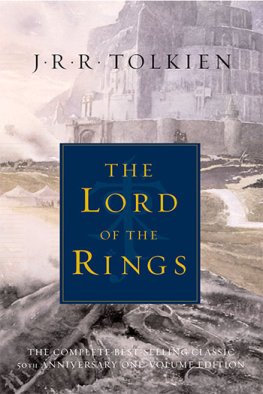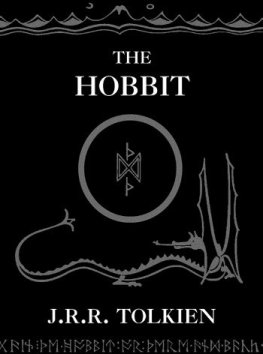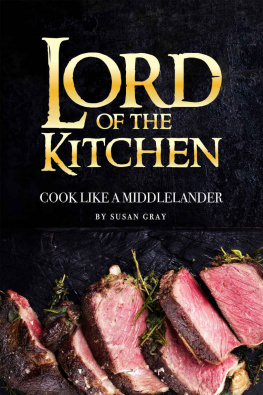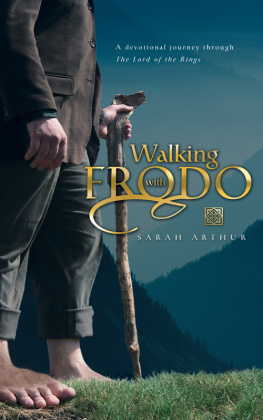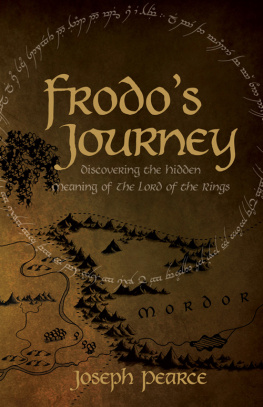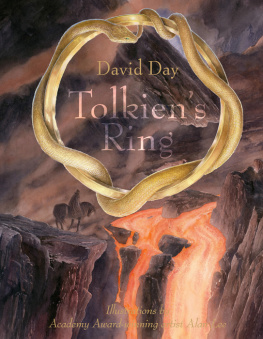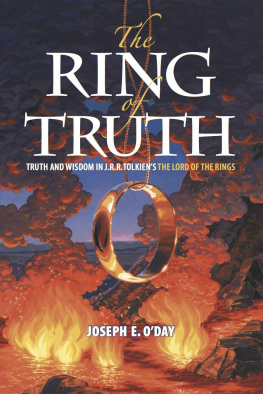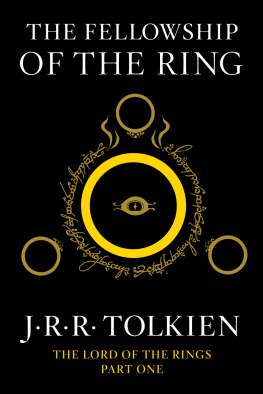JRR Tolkien The Lord of the Ring 1 - The Fellowship of the Ring
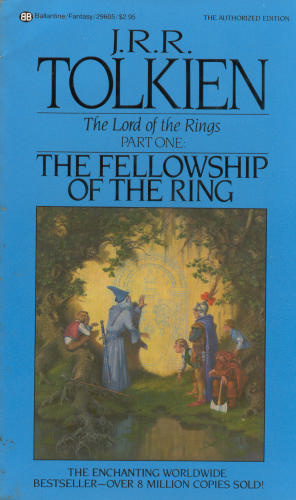
Foreward
Prologue
BOOK I
Chapter 1: A Long-expected Party
Chapter 2: The Shadow of the Past
Chapter 3: Three is Company
Chapter 4: A Short Cut to Mushrooms
Chapter 5: A Conspiracy Unmasked
Chapter 6: The Old Forest
Chapter 7: In the House of Tom Bombadil
Chapter 8: Fog on the Barrow-Downs
Chapter 9: At the Sign of
Chapter 10: Strider
Chapter 11: A Knife in the Dark
Chapter 12: Flight to the Ford
BOOK II
Chapter 1: Many Meetings
Chapter 2: The Council of Elrond
Chapter 3: The Ring Goes South
Chapter 4: A Journey in the Dark
Chapter 5: The Bridge of Khazad-dum
Chapter 6: Lothlorien
Chapter 7: The Mirror of Galadriel
Chapter 8: Farewell to Lorien
Chapter 9: The Great River
Chapter 10: The Breaking of the Fellowship
Three Rings for the Elven-kings under the sky,
Seven for the Dwarf-lords in their halls of stone,
Nine for Mortal Men doomed to die,
One for the Dark Lord on his dark throne
In the Land of Mordor where the Shadows lie.
One Ring to rule them all, One Ring to find them,
One Ring to bring them all and in the darkness bind them
In the Land of Mordor where the Shadows lie.
This tale grew in the telling, until it became a history of the Great War of the Ring and included many glimpses of the yet more ancient history that preceded it. It was begun soon afterThe Hobbit was written and before its publication in 1937; but I did not go on with this sequel, for I wished first to complete and set in order the mythology and legends of the Elder Days, which had then been taking shape for some years. I desired to do this for my own satisfaction, and I had little hope that other people would be interested in this work, especially since it was primarily linguistic in inspiration and was begun in order to provide the necessary background of 'history' for Elvish tongues.
When those whose advice and opinion I sought correctedlittle hope tono hope, I went back to the sequel, encouraged by requests from readers for more information concerning hobbits and their adventures. But the story was drawn irresistibly towards the older world, and became an account, as it were, of its end and passing away before its beginning and middle had been told. The process had begun in the writing ofThe Hobbit, in which there were already some references to the older matter: Elrond, Gondolin, the High-elves, and the orcs, as well as glimpses that had arisen unbidden of things higher or deeper or darker than its surface: Durin, Moria, Gandalf, the Necromancer, the Ring. The discovery of the significance of these glimpses and of their relation to the ancient histories revealed the Third Age and its culmination in the War of the Ring.
Those who had asked for more information about hobbits eventually got it, but they had to wait a long time; for the composition ofThe Lord of the Rings went on at intervals during the years 1936 to 1949, a period in which I had many duties that I did not neglect, and many other interests as a learner and teacher that often absorbed me. The delay was, of course, also increased by the outbreak of war in 1939, by the end of which year the tale had not yet reached the end of Book One. In spite of the darkness of the next five years I found that the story could not now be wholly abandoned, and I plodded on, mostly by night, till I stood by Balin's tomb in Moria. There I halted for a long while. It was almost a year later when I went on and so came to Lothlorien and the Great River late in 1941. In the next year I wrote the first drafts of the matter that now stands as Book Three, and the beginnings of chapters I and III of Book Five; and there as the beacons flared in Anorien and Theoden came to Harrowdale I stopped. Foresight had failed and there was no time for thought.
It was during 1944 that, leaving the loose ends and perplexities of a war which it was my task to conduct, or at least to report, 1 forced myself to tackle the journey of Frodo to Mordor. These chapters, eventually to become Book Four, were written and sent out as a serial to my son, Christopher, then in South Africa with the RAF. Nonetheless it took another five years before the tale was brought to its present end; in that time I changed my house, my chair, and my college, and the days though less dark were no less laborious. Then when the 'end' had at last been reached the whole story had to be revised, and indeed largely re-written backwards. And it had to be typed, and re-typed: by me; the cost of professional typing by the ten-fingered was beyond my means.
The Lord of the Ringshas been read by many people since it finally appeared in print; and I should like to say something here with reference to the many opinions or guesses that I have received or have read concerning the motives and meaning of the tale. The prime motive was the desire of a tale-teller to try his hand at a really long story that would hold the attention of readers, amuse them, delight them, and at times maybe excite them or deeply move them. As a guide I had only my own feelings for what is appealing or moving, and for many the guide was inevitably often at fault. Some who have read the book, or at any rate have reviewed it, have found it boring, absurd, or contemptible; and I have no cause to complain, since I have similar opinions of their works, or of the kinds of writing that they evidently prefer. But even from the points of view of many who have enjoyed my story there is much that fails to please. It is perhaps not possible in a long tale to please everybody at all points, nor to displease everybody at the same points; for I find from the letters that I have received that the passages or chapters that are to some a blemish are all by others specially approved. The most critical reader of all, myself, now finds many defects, minor and major, but being fortunately under no obligation either to review the book or to write it again, he will pass over these in silence, except one that has been noted by others: the book is too short.
As for any inner meaning or 'message', it has in the intention of the author none. It is neither allegorical nor topical. As the story grew it put down roots (into the past) and threw out unexpected branches: but its main theme was settled from the outset by the inevitable choice of the Ring as the link between it andThe Hobbit. The crucial chapter, "The Shadow of the Past', is one of the oldest parts of the tale. It was written long before the foreshadow of 1939 had yet become a threat of inevitable disaster, and from that point the story would have developed along essentially the same lines, if that disaster had been averted. Its sources are things long before in mind, or in some cases already written, and little or nothing in it was modified by the war that began in 1939 or its sequels.
The real war does not resemble the legendary war in its process or its conclusion. If it had inspired or directed the development of the legend, then certainly the Ring would have been seized and used against Sauron; he would not have been annihilated but enslaved, and Barad-dur would not have been destroyed but occupied. Saruman, failing to get possession of the Ring, would m the confusion and treacheries of the time have found in Mordor the missing links in his own researches into Ring-lore, and before long he would have made a Great Ring of his own with which to challenge the self-styled Ruler of Middle-earth. In that conflict both sides would have held hobbits in hatred and contempt: they would not long have survived even as slaves.


